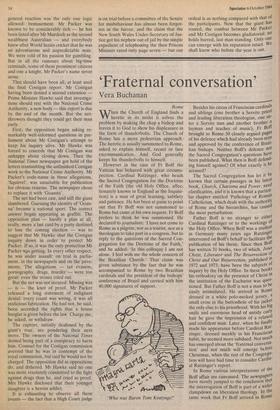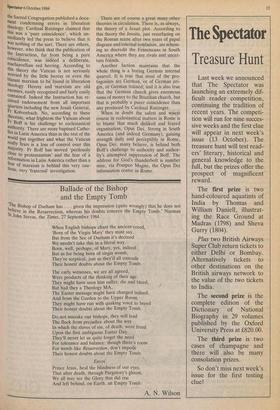'Fraternal conversation'
Vera Buchanan
Rome When the Church of England finds a heretic in its midst it solves the problem by making the chap a bishop and leaves it to God to show his displeasure in the form of thunderbolts. The Church of Rome has a more pedestrian approach. The heretic is usually summoned to Rome, asked to explain himself, recant or face excommunication. And God generally keeps his thunderbolts to himself.
However in the case of Fr Boff the Vatican has behaved with great circums- pection. Cardinal Ratzinger, who heads the Sacred Congregation for the Doctrine of the Faith (the old Holy Office, affec- tionately known in England as the Inquisi- tion) is a man of great learning, subtlety and patience. He has been at pains to point out that Fr Boff was not summoned to Rome but came at his own request. Fr Boff prefers to think he was summoned. He declared to journalists: 'I have not come to Rome as a pilgrim, nor as a tourist, nor as a theologian to take part in a congress, but to reply to the questions of the Sacred Con- gregation for the Doctrine of the Faith,' and he added: 'In this colloquy I am not alone. I feel with me the whole concern of the Brazilian Church.' That claim was given substance by the fact that he was accompanied to Rome by two Brazilian cardinals and the president of the bishops' conference of Brazil and carried with him 40,000 signatures of support.
'Who was Baron Tom Keatynge?' Besides his circus of Franciscan cardinals and siblings (one brother a Servite priest and leading liberation theologian, one sis- ter a Servite nun and another brother a layman and teacher of music), Fr Boff brought to Rome 50 closely argued pages of his defence which had already been seen and approved by the conference of Brazi- lian bishops. Neither Boffs defence nor the Sacred Congregation's questions have been published. What then is Boff defend- ing himself against? Of what exactly is he accused?
The Sacred Congregation has let it be known that certain passages in his latest book, Church, Charisma and Power, need clarification, and it is known that a partiew lar chapter entitled 'Pathology of Roman Catholicism, which deals with the authority, of Rome and the hierarchies, has caused the most perturbation. Father Boff is no stranger to either Cardinal Ratzinger or to the workings nf the Holy Office. When Boff was a student in Germany many years ago Ratzinger intervened on Boff's behalf to facilitate the publication of his thesis. Since then Bog has written 31 books, two of which, Jesus Christ, Liberator and The Resurrection of Christ and Our Resurrection, published in 1972 and 1973, have been the subjects of inquiry by the Holy Office. In these books his orthodoxy on the presence of Christ in the institution of the Eucharist was ques- tioned. But Father Boff is not a man to be easily intimidated. He arrived in Rorne dressed in a white polo-necked jersey, a small cross in the buttonhole of his jacket the only clue to his priesthood. With his big smile and enormous head of untidy curlY hair he gave the impression of a relaxed and confident man. Later, when he finallY made his appearance before Cardinal Rat- zinger, dressed meekly in his Franciscan habit, he seemed more subdued. Not much has emerged about the 'fraternal conversa- tion' and not much will emerge bt,fore Christmas, when the rest of the Congrega- tion will have had time to consider Cardin- al Ratzinger's report.
In Rome various interpretations of the Boff affair are canvassed. The newspapers have mostly jumped to the conclusion that the interrogation of Boff is part of a wider clampdown on liberation theology. In the same week that Fr Boff arrived in Rollie
the Sacred Congregation published a docu- ment condemning errors in liberation theology. Cardinal Ratzinger claimed that this was a 'pure coincidence', which im- mediately led the press to believe that it was nothing of the sort. There are others, however, who think that the publication of the Instruction, far from being a pure coincidence, was indeed a deliberate, machiavellian red herring. According to this theory the Vatican is not seriously worried by the little heresy or even the blatant marxism to be found in liberation theology. Heresy and marxism are old enemies, easily recognised and fairly easily contained. Indeed the Instruction has re- ceived endorsement from all important quarters including the new Jesuit General, Fr Kolvenbach. No, according to these theorists, what frightens the Vatican about Fr Boff is his challenge to ecclesiastical authority. There are more baptised Catho- lics in Latin America than in the rest of the world put together and what the Vatican really fears is a loss of control over this majority. Fr Boff has moved 'perilously Close to protestantism' and the fear of a reformation in Latin America rather than a fear of marxism is behind this very cau- tious, very 'fraternal' investigation. There are of course a great many other theories in circulation. There is, as always, the theory of...a Jesuit plot. According to this theory the Jesuits, just resurfacing on the Roman scene after two years of papal disgrace and internal confusion, are schem- ing to discredit the Franciscans in South America where they are rivals and uncer- tain friends.
Another faction maintains that the whole thing is a boring German internal quarrel. It is true that most of the pro- tagonists are German, or of German ori- gin, or German trained; and it is also true that the German church gives enormous sums of money to the Brazilian church, but that is probably a purer coincidence than any produced by Cardinal Ratzinger.
When in doubt the safest and wisest course in ecclesiastical matters in Rome is to blame that much disliked and feared organisation, Opus Dei. Strong in South America (and indeed Germany), gaining strength daily and perceptibly in Rome, Opus Dei, many believe, is behind both Boff's challenge to authority and author- ity's attempted suppression of Boff. The address for God's thunderbolt is number nine, via Pompeo Magno, the Opus Dei information centre in Rome.















































 Previous page
Previous page